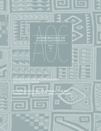
ANTHROPOLOGY OF CONSCIOUSNESS
Scope & Guideline
Illuminating the Intersection of Culture and Consciousness
Introduction
Aims and Scopes
- Exploration of Consciousness and Cultural Practices:
The journal investigates how consciousness is understood, experienced, and manifested across different cultures, particularly through rituals, art, and traditional practices. - Interdisciplinary Approaches:
It embraces interdisciplinary methodologies, integrating insights from psychology, neuroscience, and philosophy to deepen the understanding of consciousness. - Embodiment and Materiality:
The focus on how bodily experiences and material interactions influence consciousness, such as through tactile experiences, sensory deprivation, and the use of sacred plants. - Psychedelics and Altered States:
The journal features research on psychedelics, shamanic practices, and other means of inducing altered states of consciousness, exploring their cultural significances and therapeutic potentials. - Decolonization and Indigenous Knowledge:
A commitment to understanding and integrating indigenous perspectives and decolonizing methodologies in the study of consciousness, particularly in the context of sacred plants and traditional healing practices.
Trending and Emerging
- Digital and Mediated Experiences:
There is a growing interest in how digital technologies and social media influence human consciousness, particularly regarding intimacy, memory, and identity in online spaces. - Psychedelic Integration and Therapy:
An emerging trend is the exploration of psychedelics not just as substances but as integral components in therapeutic processes and cultural practices, highlighting their role in healing and consciousness expansion. - Embodied Cognition and Materiality:
Research focusing on the embodied experience of consciousness, examining how physical interactions and material culture shape mental states, is increasingly prevalent. - Interpersonal and Intersubjective Dynamics:
Emerging themes emphasize the relational aspects of consciousness, including how interpersonal interactions influence individual and collective experiences of consciousness. - Decolonial and Indigenous Perspectives:
There is a clear trend towards incorporating decolonial frameworks and indigenous knowledge systems, particularly in the context of consciousness studies and healing practices.
Declining or Waning
- Traditional Anthropological Methods:
There seems to be a reduced focus on conventional ethnographic methods, with a shift towards more innovative and experiential approaches to studying consciousness. - Historical Perspectives on Consciousness:
Topics that delve deeply into historical analyses of consciousness and its evolution are less frequently addressed, as the journal increasingly prioritizes contemporary and practical implications. - Generalized Spirituality:
Broad discussions on spirituality without specific cultural contexts or practices are becoming less common, reflecting a shift towards more targeted and nuanced explorations. - Environmental Consciousness:
Although environmental themes have been part of the discourse, their specific exploration in relation to consciousness appears to be declining, possibly overshadowed by more direct studies of consciousness in human interactions.
Similar Journals
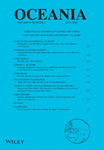
OCEANIA
Advancing Knowledge in Anthropology and PhilosophyOCEANIA, published by WILEY, is a distinguished journal that has been fostering scholarly discourse in the fields of anthropology and the history and philosophy of science since its inception in 1930. With an impressive impact factor and secure positions in the Q2 quartile for both categories, OCEANIA stands out as an influential resource for researchers and professionals alike. Its latest Scopus rankings reflect its commitment to quality, placing it in the 76th percentile for history and philosophy of science and the 66th percentile for anthropology. Though it does not operate under an open access model, the journal provides robust access options for institutions and individuals to explore its rich array of peer-reviewed articles that contribute to the understanding of cultures and scientific thought across the Pacific region and beyond. As we advance toward its continued convergence into 2024, OCEANIA remains a pivotal platform for innovative research and academic debate, cultivating insights that are crucial for scholars and students navigating the complexities of these interconnected disciplines.
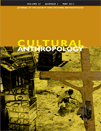
CULTURAL ANTHROPOLOGY
Fostering Interdisciplinary Dialogues in AnthropologyCULTURAL ANTHROPOLOGY is a premier journal in the field of anthropology, published by the esteemed SOC CULTURAL ANTHROPOLOGY. With an impressive impact factor and ranking in the Q1 category for both anthropology and arts and humanities, it stands as a leading platform for scholarly discourse and innovative research. Since transitioning to Open Access in 2014, the journal has made substantial contributions to the accessibility of anthropology literature, allowing a broader audience to engage with cutting-edge anthropological insights and findings. The journal's scope encompasses a wide range of cultural studies and anthropological perspectives, catering to a diverse readership that includes researchers, professionals, and students. Published from the Department of Anthropology, Rice University in Houston, Texas, CULTURAL ANTHROPOLOGY continues to shape the conversation in its field, promoting interdisciplinary dialogue and enriching the academic landscape.

ARYS-Antiguedad Religiones y Sociedades
Fostering Insights into the Dynamics of Religion and SocietyARYS-Antiguedad Religiones y Sociedades is a prestigious academic journal published by UNIV CARLOS III MADRID, INST HISTORIOGRAFIA JULIO CARO BAROJA that focuses on the intricate relationships between ancient religions and societies. With an ISSN of 1575-166X and an E-ISSN of 2173-6847, this journal has established itself as an influential platform for scholarly discourse from 2019 to 2023, achieving a commendable Q2 ranking in both History and Religious Studies categories. Despite not being an open-access journal, it offers valuable insights for researchers and professionals delving into the historical contexts of religious beliefs and their societal implications. The journal's rigorously peer-reviewed content aims to foster a deeper understanding of ancient civilizations and their spiritual practices, making it an essential resource for academics, students, and practitioners in the fields of history and religious studies. Join the growing community of scholars who contribute to and benefit from the rich tapestry of knowledge presented in ARYS-Antiguedad Religiones y Sociedades.

Time & Mind-The Journal of Archaeology Consciousness and Culture
Revealing the Depths of Consciousness in Cultural ContextsTime & Mind - The Journal of Archaeology Consciousness and Culture, published by Routledge Journals, Taylor & Francis Ltd, stands at the intersection of archaeology and consciousness studies, revealing the intricate relationship between cultural practices and human cognition. With a robust ISSN of 1751-696X and an E-ISSN of 1751-6978, this esteemed journal plays a vital role in fostering interdisciplinary dialogue among scholars in the realms of anthropology and archaeology. Notably recognized for its rigorous academic standards, it achieved a commendable Q2 category ranking across various fields in 2023, including Anthropology and Archeology, alongside impressive Scopus rankings. As it continues to publish cutting-edge research from 2008 to 2024, this journal remains dedicated to exploring the nuances of human experience through the lens of archaeological evidence, making it an indispensable resource for researchers, professionals, and students alike seeking to deepen their understanding of the cultural dimensions of consciousness.

PHILOSOPHICAL STUDIES
Navigating New Dimensions in Philosophical ResearchPhilosophical Studies, published by Springer, is a prestigious peer-reviewed journal that stands at the forefront of philosophical discourse since its inception in 1950. With ISSN 0031-8116 and E-ISSN 1573-0883, this journal has firmly established itself as a critical platform for disseminating high-quality research in philosophy, positioned in the Q1 category for Philosophy with an impressive Scopus rank of #73 out of 806, placing it in the 90th percentile of its field. Although it does not offer Open Access, the journal’s rigorous selection process ensures that only the most relevant and impactful studies are published, making it an invaluable resource for philosophers, academics, and students alike. With a commitment to advancing philosophical inquiry and fostering a vibrant scholarly community, Philosophical Studies continues to attract contributions that challenge prevailing paradigms and explore new dimensions in philosophical thought. The journal's scope encompasses a wide array of topics within philosophy, encouraging interdisciplinary engagement and dialogue.

JOURNAL OF CONSCIOUSNESS STUDIES
Advancing Interdisciplinary Insights into Awareness.JOURNAL OF CONSCIOUSNESS STUDIES, published by IMPRINT ACADEMIC, is a leading multidisciplinary platform dedicated to the exploration of consciousness, philosophy, and cognitive science. Established in 1996, this journal has garnered recognition within several academic categories, achieving a 2023 Q1 classification in Philosophy and a Q2 ranking in Psychology and Ecology, among others. With an emphasis on innovative perspectives and interdisciplinary research, the journal aims to foster dialogue among researchers, professionals, and students who share a keen interest in understanding the complex nature of consciousness and its implications across various fields. Though it does not operate under an open access model, the journal provides comprehensive content that is vital for advancing scholarly discourse. With significant influence reflected through its Scopus rankings and a commitment to high-quality research, the JOURNAL OF CONSCIOUSNESS STUDIES remains an essential resource for those engaged in the ever-evolving study of consciousness.

Phenomenology and the Cognitive Sciences
Fostering Dialogue at the Intersection of Cognition and PhilosophyPhenomenology and the Cognitive Sciences is a leading interdisciplinary journal published by Springer, dedicated to exploring the intersections of cognitive science and phenomenological philosophy. Since its inception in 2004, this journal has established itself as a vital resource for researchers and scholars, achieving Q2 status in Cognitive Neuroscience and Q1 in Philosophy according to the 2023 Category Quartiles, highlighting its significance in both fields. With an ISSN of 1568-7759 and an E-ISSN of 1572-8676, the journal provides a platform for innovative research, fostering insightful dialogues that bridge the gaps between cognitive processes and human experience. Its current Scopus rankings place it in an impressive 97th percentile for Philosophy and 59th percentile for Cognitive Neuroscience, reflecting its academic impact. Although not an open-access journal, researchers and students can access its rich repository of articles to deepen their understanding of how cognitive science informs philosophical inquiry and vice versa, making it an indispensable tool for anyone committed to advancing knowledge in these vital areas.

Social Text
Exploring the Intersections of Culture and SocietySocial Text, published by DUKE UNIVERSITY PRESS, is a leading peer-reviewed academic journal that has established itself as a critical platform for interdisciplinary research in the fields of Anthropology, Cultural Studies, and Gender Studies. With its impressive ranking in the Q1 category for each of these disciplines in 2023, it occupies a prominent place within the academic landscape—ranked 33rd out of 1304 in Cultural Studies and significantly within the top 20 in both Anthropology and Gender Studies. The journal publishes innovative theoretical and empirical work that challenges and expands upon conventional methodologies and perspectives, aiming to foster a deeper understanding of social phenomena. While Social Text is not an open-access journal, it remains easily accessible through university libraries and academic institutions, ensuring that cutting-edge scholarship reaches a wide audience. This journal is a vital resource for scholars, researchers, and students looking to stay informed about the latest trends and debates within the humanities and social sciences.
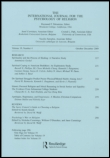
International Journal for the Psychology of Religion
Pioneering Research at the Crossroads of Religion and MindWelcome to the International Journal for the Psychology of Religion, a leading academic platform dedicated to the exploration of the intricate relationship between psychological processes and religious beliefs. Published by Routledge Journals, Taylor & Francis Ltd, this esteemed journal serves as an essential resource for researchers, professionals, and students in the fields of psychology and religious studies. With an impressive impact factor and a robust Scopus ranking, including a Q1 classification in Religious Studies and a Q2 in miscellaneous Psychology categories, it stands out for its rigorous academic contributions. The journal's scope has evolved over the years, maintaining its relevance since its inception in 1991 and continuing to present innovative research through 2024. While primarily subscription-based, it encourages submissions that push the boundaries of understanding in both disciplines. Engage with cutting-edge studies that illuminate the psychological dimensions of religious practices, belief systems, and their impacts on human behavior.
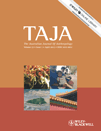
Australian Journal of Anthropology
Advancing the Frontiers of AnthropologyThe Australian Journal of Anthropology, published by Wiley, stands as a pivotal resource in the field of anthropology, reflecting a deep commitment to advancing scholarly discourse since its inception in 1990. With an ISSN of 1035-8811 and E-ISSN 1757-6547, this journal provides a platform for innovative research and critical analysis, contributing to the global anthropology community. Based in the United States, at 111 River St, Hoboken, NJ, it has established itself in the Q3 category of anthropology journals, ranking #162 out of 502 in Scopus, placing it in the 67th percentile among its peers. While it is not currently an open-access publication, the journal remains dedicated to accessibility through institutional subscriptions and provides a wealth of insight into anthropological methods and cultural studies. It seeks to foster interdisciplinary dialogue and promote a comprehensive understanding of social dynamics, making it an essential read for researchers, professionals, and students eager to enrich their knowledge and engage with contemporary anthropological issues.